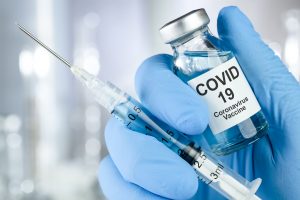Japan began its COVID-19 vaccine rollout in mid-February, months after other developed countries. While the vaccination effort has picked up speed in recent weeks, the country has only fully inoculated just under 12 percent of the population as of June 29. Whether Japan can take control of the pandemic by achieving some of its vaccination targets could help determine whether Prime Minister Suga Yoshihide remains in office beyond the fall.
Japan was successful in avoiding mass COVID-19 outbreaks in the initial stages of the pandemic, but the country has seen a surge of cases in recent months. Japan’s first COVID-19 death was recorded in February 2020, and while it took 11 months for Japan to exceed 5,000 deaths, the number doubled in three months from January 2021 and now stands at over 14,000.
Japan’s vaccine rollout was delayed partly due to the country’s strict safety procedures. Japan, which relies on foreign suppliers for COVID-19 vaccines, required domestic clinical trials on top of the multinational trials the companies conducted. This delayed the government’s approval of the vaccines.
Suga is under heavy pressure to contain COVID-19 cases, particularly as Tokyo prepares to host the Olympic and Paralympic Games from July 23. While the prime minister controlled the surge somewhat by repeatedly evoking states of emergency, vaccination is seen as key to lowering the number of cases. A recent poll shows that public opposition to holding the Olympics, which was as high as 80 percent earlier in the year, has eased but remains close to 50 percent.
Suga’s publicly stated goal is to fully inoculate Japan’s 36 million senior citizens by the end of July and to finish vaccinating the entire adult population by around October or November. Japan has secured enough vaccines to do so and has overcome some initial challenges, including ensuring there are enough trained medical staff to administer the shots. But the country hit a snag recently when demand for vaccines in its workplace inoculation program far outstripped the supply of doses, forcing it to suspend new registrations.
Whether the Japanese public perceives Suga as containing the pandemic holds the key to support for his cabinet. The cabinet’s approval rating, which was around 60 percent when Suga took office in September, dropped as COVID-19 cases rose from earlier in the year, and now stands below 40 percent.
Public support is important for Suga as he faces two major political events later this year. One is the leadership race of the ruling Liberal Democratic Party (LDP), which must be held around the time Suga finishes serving out the term of his predecessor, Abe Shinzo, in late September. The party election is usually determined by votes from both LDP lawmakers and party members from the public. The head of the LDP becomes the prime minister of the country as long as the party maintains a majority, even as a governing coalition.
Suga is a rare LDP prime minister who does not belong to a party faction. That means he needs the backing of key LDP members and their groups. The good news for Suga is that he currently appears to have the support necessary to remain at the party’s helm. Also in Suga’s favor is the fact that no major challenger has yet expressed a desire to run against him. But Suga’s reliance on others means that change could happen quickly should there be challenges to his leadership.
The other key event on the political calendar is the election of the House of Representatives. This race needs to take place in the near term as members’ terms expire in late October. The election will determine the strength of the LDP in the lower and more influential chamber of Japan’s bicameral parliament.
Suga has some control over the timing of the events, as the prime minister can dissolve the lower house for a snap election at any time. He may do so before the LDP leadership race if his cabinet’s support rating improves. That could raise the chances of the LDP winning enough seats in the parliamentary election, allowing him to claim credit and remain in office. If the LDP does not fare well, however, he could face calls for a leadership change. If the LDP leadership race takes place first, he could face challengers, depending on how well he is managing the pandemic.
Regardless of the timing, the parliamentary election appears unlikely to lead to a major political upheaval for Japan, at least for now. This is because the LDP and its ruling coalition partner the Komeito hold two-thirds of the seats in the House of Representatives, and the approval rating of the main opposition Constitutional Democratic Party of Japan remains in the single digits. Even if the vaccine rollout falters and the LDP loses seats, the party could still stay in power. Whether Suga will be leading it, however, is somewhat more questionable.

































